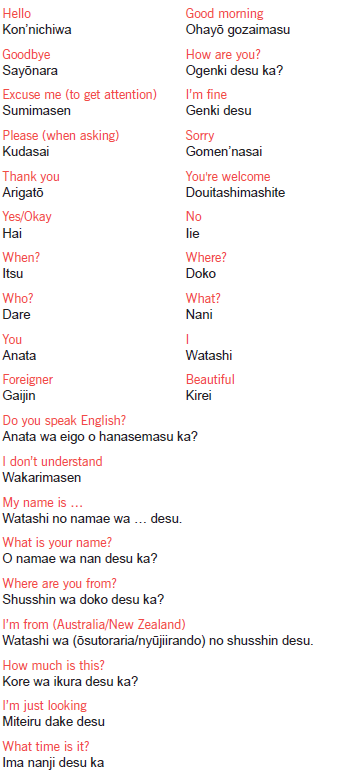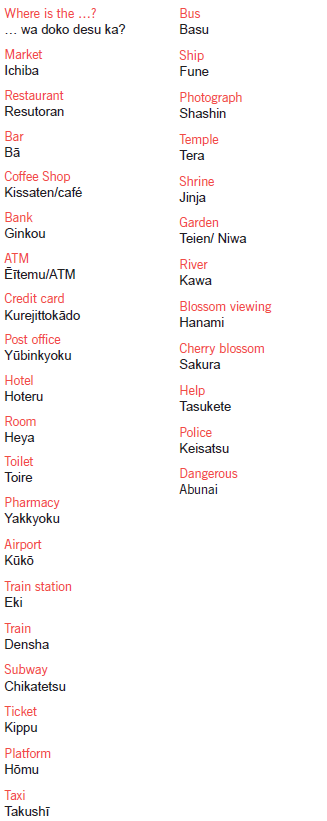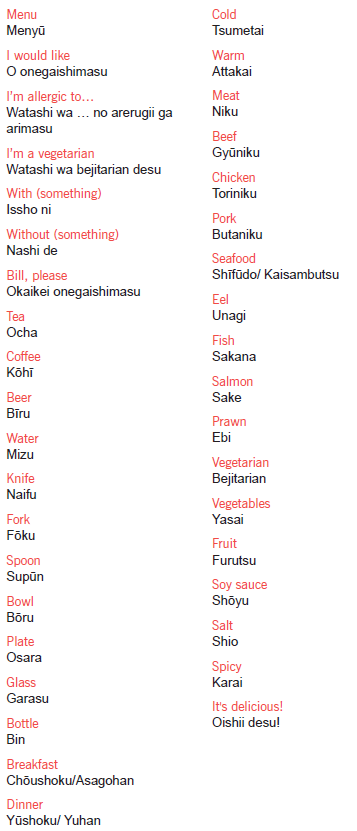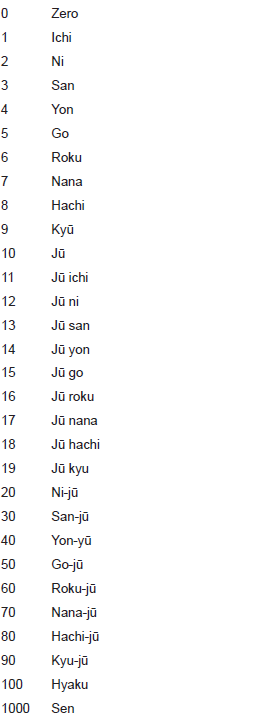Phrasebook (Japan)
Learn about the Japanese language and useful phrases to help you during your travels
Japanese is the official language of Japan, and is spoken by more than 130 million people. Little is known about when the language first appeared in Japan. Although there is some evidence that it was spoken sooner, substantial texts did not appear until the 8th century. Old Japanese was heavily influenced by Chinese in the Heian period (794-1185). Between 1185-1600, changes in the language brought Japanese closer to the modern language and European loanwords first appeared. After the end of Japan’s self-imposed isolation from the world in 1853, the flow of loanwords from European languages increased, and there are now in particular quite a number of Japanese words that have English roots.
Japanese has a complicated writing system consisting of two sets of phonetic syllabaries and thousands of Chinese characters called “kanji”. The syllabic writing systems “hiragana” and “katakana” were created out of “kanji”, and today Japanese is written with a mixture of the three. Japanese texts can be written in Western style, i.e. in horizontal rows from the top to the bottom of the page, or in traditional Japanese style, i.e. in vertical columns from the right to the left side of the page. Both writing styles exist side by side today.
One of the most fascinating things about the Japanese language is the extensive grammatical system dedicated to expressing politeness and formality – this includes ‘polite language’, ‘respectful language’ and ‘humble language’. Which you use is determined by the social status of yourself and the person that you are speaking to – so different words and expressions are used when talking to an unknown person or a superior, as opposed to when talking to a child, family member or a close friend. There are for example more than five different words for the English word “I”, which are used depending on the context.
Compared to many other languages, Japanese has relatively few sounds, and pronunciation is fairly easy. However, there are many homonyms, i.e. words that are pronounced the same way, but have different meanings.
We have provided a few words and phrases that may come in handy during your tour.
Getting Started



Numbers

FOOD ALLERGIES & DIETARY REQUIREMENTS
Below you will find common dietary requirements below written in Japanese. We suggest printing the ones that may be applicable to you to show at restaurants, particularly if you have a independent touring arrangements. For Group Tours, your National Escort will assist you during your tour. Read more on Eating in Japan here.
GLUTEN FREE
- I am allergic to gluten
私はセリアック病です
Watashi wa seriakku-byōdesu
- Gluten is in wheat, rye, oats, soy sauce, barley and similar products derived from grains
グルテンは、小麦、ライ麦、オート麦、醤油、大麦などの穀物由来の製品に含まれています
Guruten wa, komugi, raimugi, ōto mugi, shōyu, ōmugi nado no kokumotsu yurai no seihin ni fukuma rete imasu
VEGETERIAN
- I am vegetarian
私はベジタリアンです
Watashi wa Bejitarian desu
- I do not eat any kind of meat from animals. I also do not eat seafood.
私は、お肉を食べません. 海の幸も食べません
Watashi wa oniku wo tabemasen
VEGAN
- I am vegan
私はビーガンです
Watashi wa Bejitarian desu
- I do not eat any kind of animal product. This includes meat, milk, honey, eggs, fish, gelatin or any product that comes from animals.
私はどんな動物製品も食べません。私は、肉、魚、卵、乳製品を食べません. 私は、バター、チーズ、卵、はちみつを食べません.
Watashi wa don'na dōbutsu seihin mo tabemasen. Watashi wa niku sakana tamago nyuuseihin wo tabemasen. Watashi wa bataa chiizu tamago hachimitsu wo tabemasen.
SHELLFISH
- I cannot eat shellfish
貝類やエビ等一切食べられません。
Kairui ya ebi-tō issai tabe raremasen.
- I cannot eat shrimp, crab lobster, clams, mussels, oysters, scallops and similar types of seafood
私はエビ、カニのロブスター、アサリ、ムール貝、カキ、ホタテなどのシーフードを食べることはできません
Watashi wa ebi, kani no robusutā, asari, mūru kai, kaki, hotate nado no shīfūdo o taberu koto wa dekimasen.
NUTS
- I am allergic to nuts
私は、ナッツ類のアレルギー症があります
Watashi wa, nattsu-rui no arerugī-shō ga arimasu
- I cannot eat any type of nuts including peanuts, almonds, brazil nuts, walnuts, hazelnuts, macadamia nuts, pistachios, pecans, cashews and any other form of nuts
ピーナッツ、アーモンド、ブラジルナッツ、クルミ、ヘーゼルナッツ、マカデミアナッツ、ピスタチオ、ピーカンナッツ、カシューナッツ、その他のナッツ類を含むナッツ類は食べられません。
Pīnattsu, āmondo, burajirunattsu, kurumi, hēzerunattsu, makademianattsu, pisutachio, pīkan'nattsu, kashūnattsu, sonohoka no nattsu-rui o fukumu nattsu-rui wa tabe rarenai
DAIRY FREE
- I cannot eat dairy
乳製品が食べられない
Nyūseihin ga tabe rarenai
- This includes milk, cream, cheese, butter and other similar products
これは牛乳、クリーム、チーズ、バターおよび他の同様の製品を含みます
Kore wa gyūnyū, kurīmu, chīzu, batā oyobi hoka no dōyō no seihin o fukumimasu
Next: Travel Health